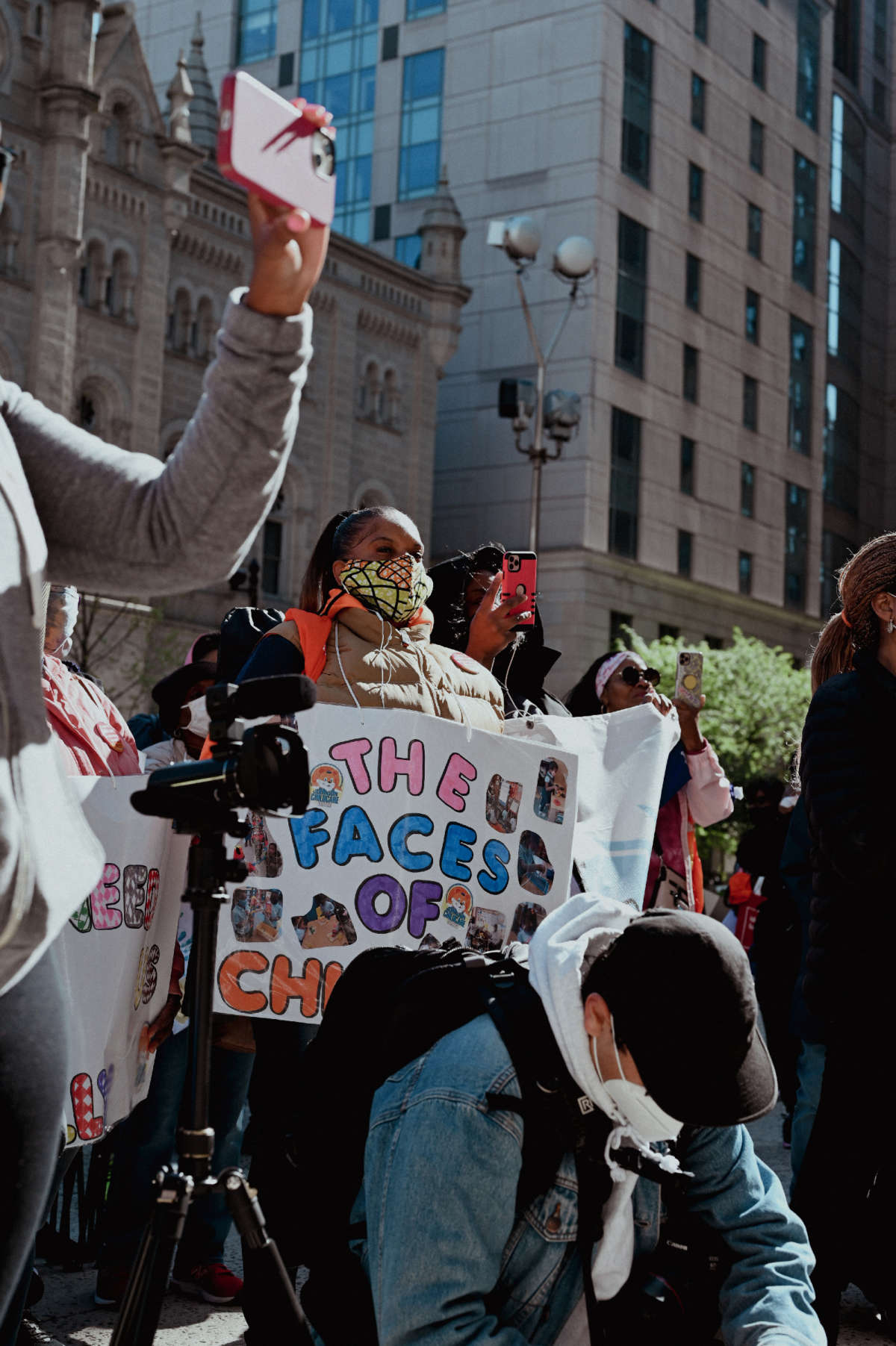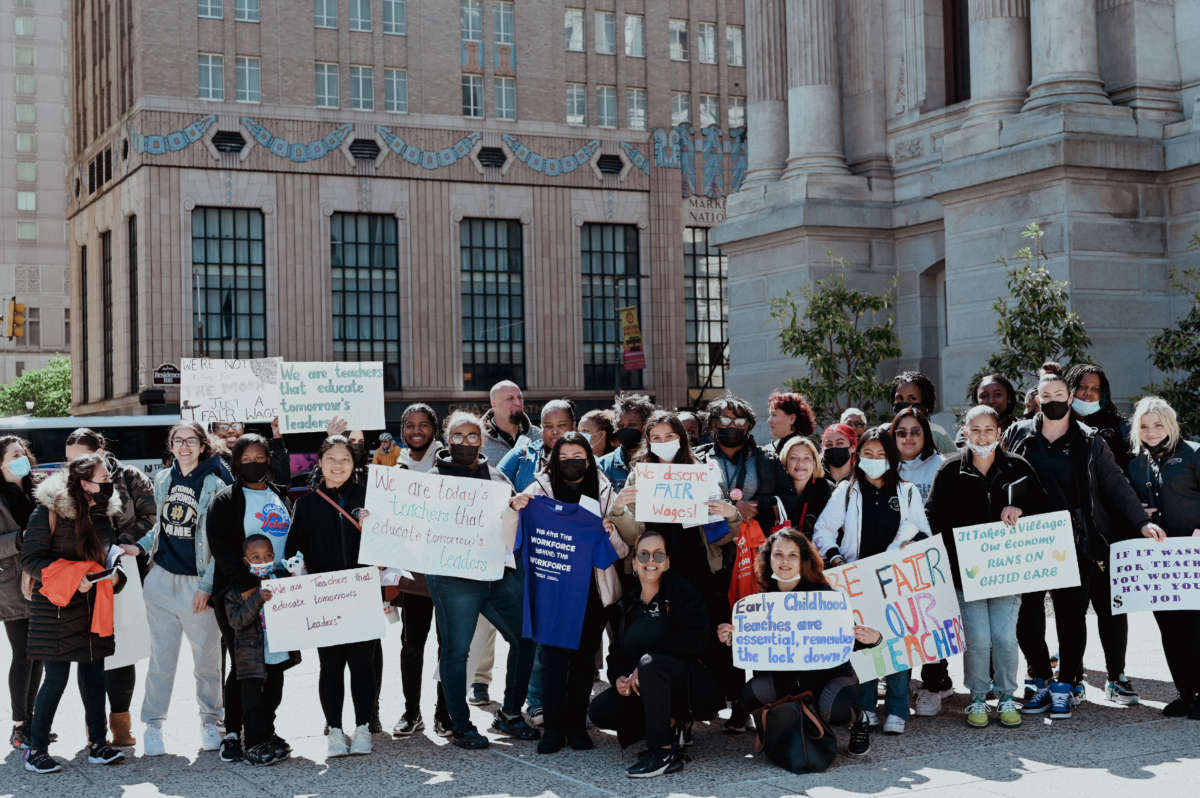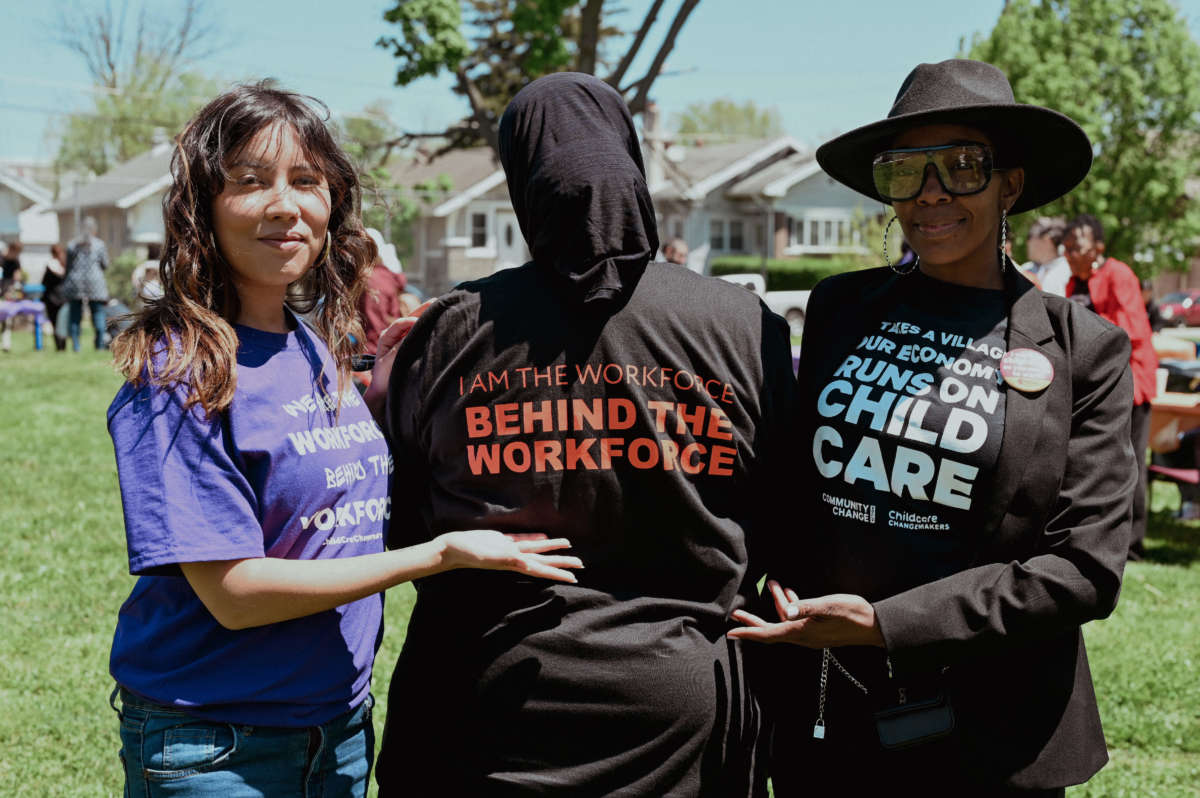Part of the Series
The Struggle for Caregiving Equity
Shineal Hunter is proud to be a child care provider in Philadelphia, where parents depend on her daycare center to help their children grow and learn while they are busy at work. Hunter is also proud that her daughters want to follow in her footsteps and care for children — but she does not want them send them into an “industry of poverty” where workers do not receive a livable wage.
“Why should I not be paid the same rate as someone in the school district?” Hunter said in a statement on Monday. “I want to uplift as many Black and brown women and children that I can, but I’m constantly struggling with keeping my doors open with all the bureaucracy that I have to contend with just to make a living.”
Hundreds of child care workers held a “strike” on Monday with support from the children and families they work with. Some closed their daycare centers for a few hours, others called in sick. They gathered at the halls of power in dozens of cities to demand that policy makers at all levels of government make broad public investments to ensure that child care providers receive a living wage, and parents can afford to send their kids to a nurturing environment.
“I want my daughters to know that on May 9, I stood with other child care providers and other parents who wanted to utilize the voice that we have to let elected officials know that we’re no longer going to tolerate disrespect,” Hunter said. “I am here, ready to do the work, and I’m not going to stop.”
The national day of action comes as the country reels from the revelation that the Supreme Court could soon eliminate the right to abortion. Advocates everywhere are pointing out that 24 states would immediately prohibit access to abortion if Roe v. Wade is overturned. Republicans could allow 13 states to impose criminal penalties on people who obtain abortions or care for someone who does. Yet even as they condemn abortion care — which, advocates emphasize, should be recognized as a basic human right — conservative abortion opponents remain unwilling to invest in child care, health care, and other supports that families need to thrive.
“Women of color who have poor access to reproductive justice are also the same women who have poor access to child care in their communities,” said Wendoly Marte, economic director at the national social justice organization Community Change Action, who is organizing with the striking child care workers, in an interview. “Our economy runs on child care.”
Yet Republicans and a handful of conservative Democrats in Congress have blockaded President Biden’s social legislation once known as Build Back Better, which would pump federal money into daycares, preschools and early childhood education programs to raise wages for providers, and make child care more affordable for families.
Biden’s plan would also expand paid sick and family leave in a country where 77 percent of private-sector workers have no paid parental leave, and six in ten workers do not have paid medical leave through their employer insurance, according to the National Partnership for Women & Families.

The crisis is severe for both parents and providers, groups that very often overlap, advocates say. Nearly half a million families are looking for affordable child care and cannot find it, according to Community Change Action. Meanwhile, child care providers are often overworked and underpaid, especially in middle and lower-income communities where the cost of child care can consume a significant chunk of a parent’s paycheck. Without higher wages, the demand for child care will always outpace the workforce, where 94 percent of workers are women and 40 percent are women of color.
The number of people working in child care has declined steadily since 2017, a trend exacerbated by the COVID-19 pandemic, according to Jessica Milli, an economist and author of a new study on the child care workforce. The number of child care facilities that accept children from lower-income families who rely on federal block grant funding to help pay for child care has also plummeted by 60 percent in the same time frame.
“There is an urgent need for public investment in the child care sector in order to support living wages that can help attract and retain qualified educators and to also ensure that families have access to affordable and reliable child care,” Milli said in a statement.
Child care workers and their supporters are also targeting large employers that do not offer paid family leave and wages high enough to pay for child care. In Chicago protesters gathered outside Amazon’s corporate office on Monday. State data shows the company is among the top three recipients of Illinois child care assistance funding that its employees rely on so their children have a place to be while they are at work, according to Community Change Action. Amazon and other large corporations are also responsible for a combined state and local tax shortfall estimated to be between $43 billion and $57 billion, the Economic Policy Institute reports. That’s enough money to pay for high quality, universal pre-kindergarten programs for children ages 3 and 4 nationwide, advocates say.

“Child care infrastructure is just one piece; we need to keep a stable job make sure the kids have food on the table, to pay for rent,” Marte said. “We know that when women thrive, the whole family thrives, and when the whole family thrives, the whole society thrives.”
Marte and other advocates say broad investment in child care with strong racial justice and equity guardrails to ensure the money is not misused would easily pay for itself by improving family wellbeing and lifting families out of poverty. Hunter concurs, emphasizing that supporting children and families must involve a multi-pronged push for economic justice.
“People can’t go to work if they have nowhere to take their children,” Hunter said. “We need an equitable system that is supporting both parents, providers and the economy.”
Join us in defending the truth before it’s too late
The future of independent journalism is uncertain, and the consequences of losing it are too grave to ignore. To ensure Truthout remains safe, strong, and free, we need to raise $27,000 in the next 24 hours. Every dollar raised goes directly toward the costs of producing news you can trust.
Please give what you can — because by supporting us with a tax-deductible donation, you’re not just preserving a source of news, you’re helping to safeguard what’s left of our democracy.
